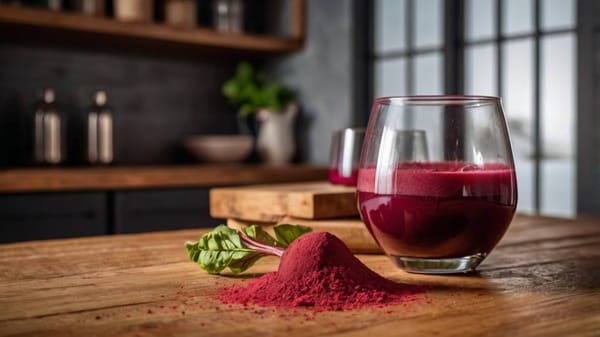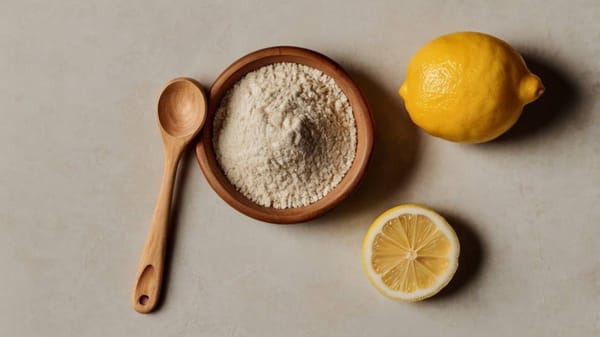Prebiotics: 5 Reasons Everyone’s Talking About It
Discover how prebiotics can transform your digestion, mood, and sleep—it’s the simplest upgrade your body’s been missing.

Ever wonder why your gut might be the key to better energy, mood, and sleep—without changing your whole lifestyle? Prebiotics are finally getting the attention they deserve, and for good reason.
They don’t just support digestion; they quietly upgrade how your body works behind the scenes.
If your digestion feels off or inconsistent, adding prebiotics could be the missing step your gut’s been waiting for. It’s simple, powerful, and easier than you think.
What Are Prebiotics—And Why Should You Care?
Let’s clear up the confusion. Probiotics are the live bacteria—the good guys. Prebiotics are what feed them.
Think of probiotics as the seeds in your gut’s garden, and prebiotics as the fertilizer that helps them grow, thrive, and crowd out the bad stuff.
You need both—but most people skip the prebiotic part entirely. Without it, your gut can’t maintain balance, no matter how many probiotic pills you take.
When your gut flora gets the food it needs, it produces more short-chain fatty acids (like butyrate), strengthens your gut lining, reduces inflammation, and improves nutrient absorption.
Translation? You feel sharper, lighter, and more resilient—without even changing your diet.

The Silent Damage of a Starving Gut
Here’s what no one talks about: your gut bacteria can decline over time—not just in number, but in diversity and strength. Add in stress, processed food, antibiotics, or even common medications, and your gut gets thrown off even more.
Symptoms creep in slowly.
- You feel full after small meals
- Your stomach feels “off” more often than not
- You rely on coffee to get moving and wine to wind down
- You crash midday or wake up wired at 3AM
You chalk it up to stress or burnout. But it’s often gut imbalance. Your good bacteria are underfed and outnumbered.
Prebiotics shift the balance back in your favor—feeding the helpers, restoring control, and calming the system from the inside out.
Why You’re Not Getting Enough (Even If You Eat Clean)
You might already eat your veggies. You might even track fiber. But here’s the twist: not all fiber is prebiotic. Most isn’t.
The true prebiotic fibers—like inulin, FOS (fructooligosaccharides), GOS (galactooligosaccharides), and resistant starch—are found in very specific foods, and usually in raw or undercooked forms your body isn’t used to.
Chicory root, raw garlic, raw asparagus, Jerusalem artichoke... not exactly everyday meals, right?
That’s why prebiotic supplements are taking off. One scoop or capsule a day gives you a precise dose—no food prep, no guessing.
It’s efficient, beginner-proof, and actually works behind the scenes to improve everything from energy to digestion to mood.
Prebiotics and the Brain: A Connection You Can Feel
Here’s what blows people’s minds: your gut is the largest producer of neurotransmitters in your body. Not your brain.
Over 90% of your serotonin—the neurotransmitter that keeps your mood balanced and your mind focused—is made in your gut. Same with dopamine and GABA, which influence motivation, calm, and sleep.
If your gut bacteria are out of balance or underfed, these chemical signals break down. You feel “off,” even if nothing’s wrong.
Prebiotics help correct that—by encouraging the growth of bacteria that produce and regulate these key brain chemicals. The result?
- You’re less reactive.
- You sleep deeper.
- You think clearer.
- Your mood holds steady—even on rough days.
This isn’t a pill for happiness. It’s a reset button for the system that manages it.
Easy to Stack, Even Easier to Stick With
One of the biggest strengths of prebiotics is how effortlessly they fit into your existing habits. You don’t need to change your diet.
You don’t need to time it around meals. And you definitely don’t need to “cycle” them like some supplements.
You can:
- Mix prebiotic powder into your morning coffee (most are tasteless)
- Add it to your protein shake or greens
- Take a capsule alongside your vitamins
They work quietly in the background, boosting your gut bacteria, improving digestion, and making your body more efficient at everything it already does.
They also enhance the other supplements you’re already taking:
- Probiotics get the food they need to multiply.
- Magnesium absorbs better.
- Collagen and protein get digested more smoothly.
- Creatine and performance supplements get processed more efficiently.
Prebiotics don’t just work—they make everything else work better.
What Happens When You Start
Most people notice subtle wins in the first 5–7 days. Less bloating, smoother digestion, easier mornings.
By week two, energy holds up longer. Your mood levels out. Food cravings quiet down.
Week three? You’re not just feeling better. You’re operating better. Regular. Clear-headed. More in tune with your body.
This isn’t a caffeine boost. It’s a reset. A stable, gut-driven shift that supports you day after day—especially when life gets messy, stressful, or unpredictable.
Final Thoughts
If you’re serious about staying energized, clear-headed, and in control, don’t ignore your gut. It’s running the show, and prebiotics are the fuel it’s been missing.
They’re simple. They’re proven. And they’re one of the easiest, lowest-effort ways to upgrade your health from the inside out.
Start now. Pick a high-quality prebiotic supplement. Add it to your routine this week. Let your gut do the rest.
You’ll be surprised how much better life feels when your body has what it needs to thrive.




